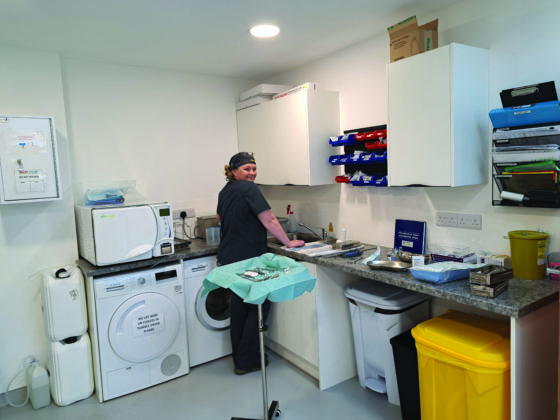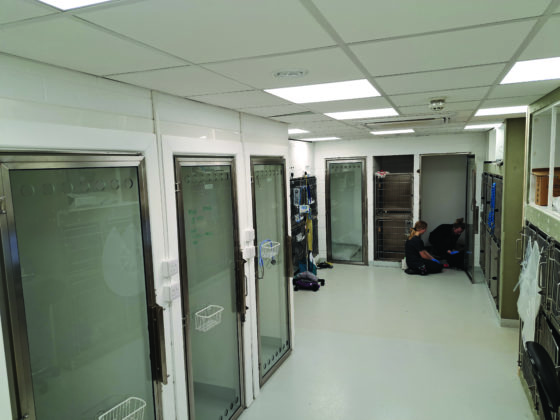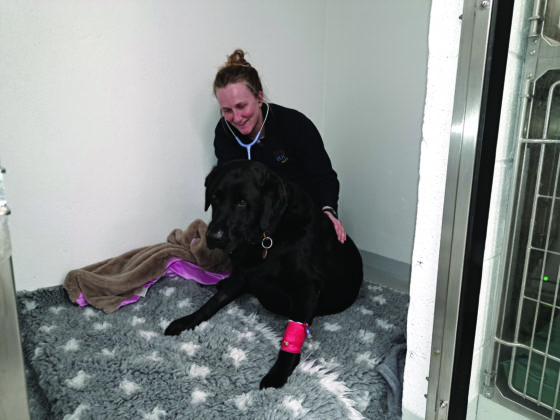1 Mar 2024
Creating a new veterinary practice is often a team effort, and that was certainly the case when Beacon VetCare in Cornwall opened last year. It might be the names of Colin and Lizzy Whiting above the door, but this new community business is the work of many hands, as <em>VBJ</em> discovered when we paid a visit last month...
Beacon VetCare, Summercourt and Newquay, Cornwall.
Staff: full-time vets 10 • registered veterinary nurses 16 • practice administrators 6
Fees: initial consult £42 • follow-up £38
The dictionary definition of a beacon is “an intentionally conspicuous device designed to attract attention to a specific location”.
A good name then for the two practices in mid-Cornwall that opened just a few months apart and have already caught the eye of more than 1,000 pet owners.
But there is actually another, more prosaic reason why Colin and Lizzy Whiting picked that name for their new practice hub at Summercourt on the A30 and its radial clinic in Newquay six miles away – the two sites sit at opposite ends of Beacon Road.
In finding such a strong location for their new venture, the Whitings were helped by the fact they already knew the area well. When Colin was offered the opportunity to open Cornwall’s first surgical referral centre in 2007, the couple came down with their two children, and Lizzy, a fellow University of Liverpool graduate, took a job as assistant vet in another local practice.
Cases were soon coming in from across Cornwall and south Devon as the referral business thrived, and Colin eventually became a director of the business.
After the board opted to sell to a corporate group in 2018, Colin remained for a year, respecting binding out clauses, before leaving to launch a peripatetic surgical service with many of the practices that had referred him cases previously.
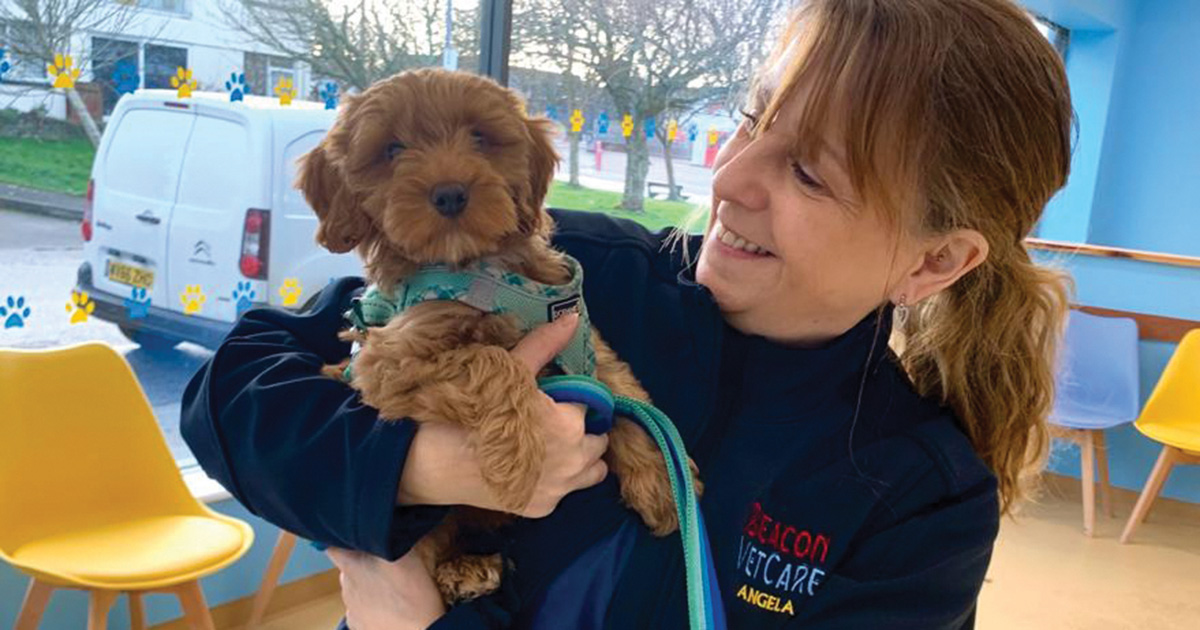
That team began with Jade Pascoe RVN joining Colin and Lizzy as directors, then grew to four nurses – all experienced former colleagues – working alongside the Whitings, running busy surgical lists during regular host practice visits.
During that period, the team also began the process of working out what they wanted in their own practice, often drawing on “best practice” from hosts, too – from a strong community practice ethos to the best flip-lid bins.
And it was while driving each day along the A30, the main road running down Cornwall’s spine, they spotted an ideal site for their proposed hospital on a small industrial estate just outside Summercourt in a two-storey former carpet showroom.
Lizzy explained: “We calculated that it was a 40-minute drive from Penzance to the west and from Launceston, at the eastern end of the county. It is also about halfway between the north and south coast – indeed, the exact geographical mid-point of Cornwall is just a mile away.
“Even better, the building is within sight of that very busy road and so any business setting up here pretty well advertises itself.
“Our goal is to provide high-quality care for the pets in our community – for emergency and out-of-hours cases, and for referrals – all at an affordable price. The only way to ensure that we can do that is to be as efficient as we possibly can.”
The dimensions of each room in the hospital site at Summercourt were carefully drawn and redrawn as the team worked on the optimal workflow through the building.
Directors were also keen on the concept of a hub and spoke practice, incorporating referral and emergency services, set around the main site.
The availability of a former supermarket set in a bustling local community with abundant parking on the northern edge of Newquay accelerated their plans. They took a leap of faith and purchased it, with a view to renovate and fit out in due course.
During spring 2023, delays in the Summercourt build transpired – in part due to the fact that Colin and Lizzy were committed to making the practice accessible for all, and insisted on a lift in the design. This had knock-on fire safety effects and the project stalled while building regulation compliance issues were resolved.
However, the build team was able to transfer to the much simpler single-storey Newquay project, which opened for business in September 2023.
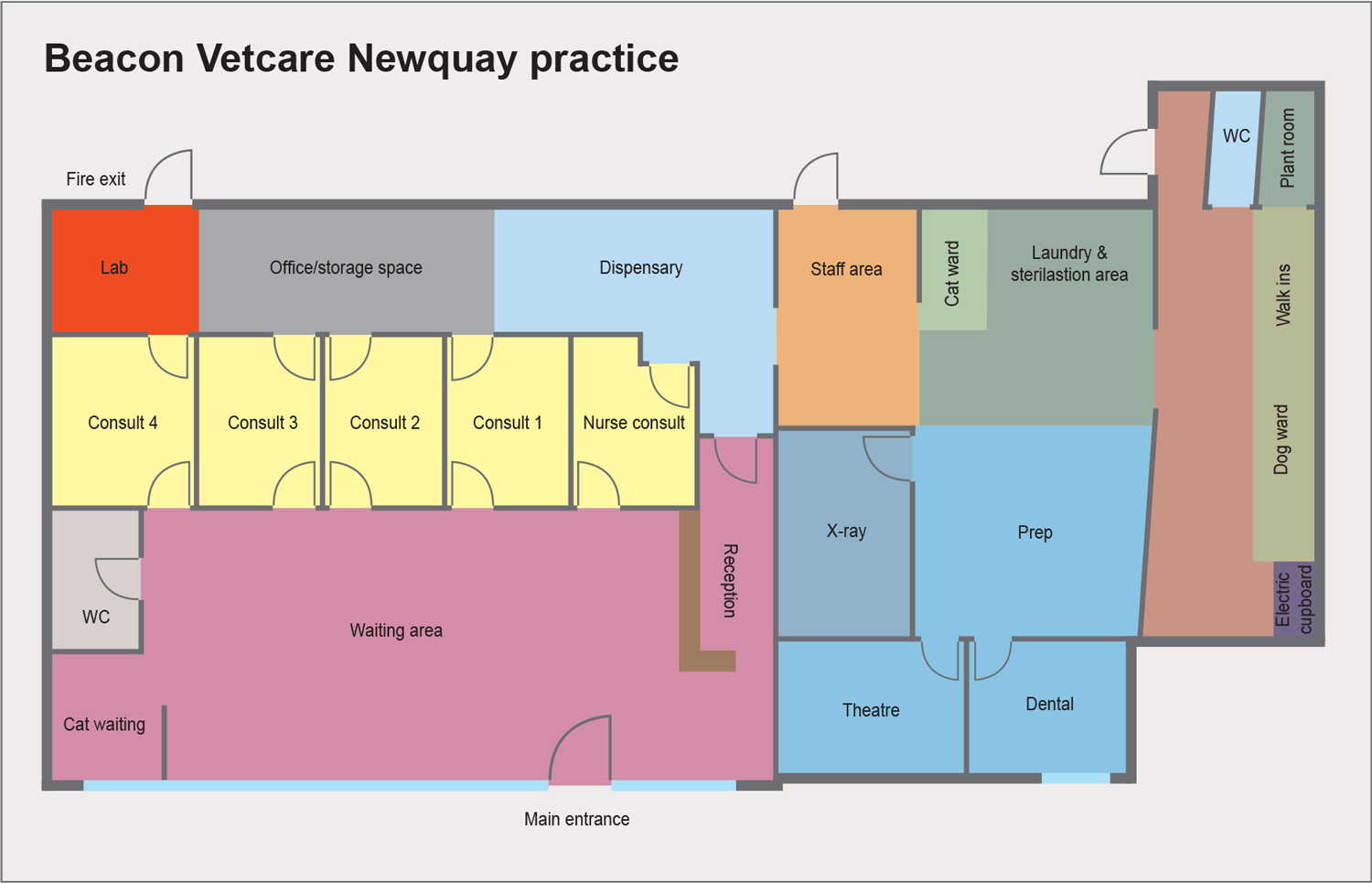
At the hospital site, work on the ground floor clinical areas was completed in time to take in the first patients in mid-January 2024, while the builders completed the first floor facilities. By then, after being open for less than four months, the Newquay branch had already registered more than 1,000 pet owners.
Colin said: “We’ve worked backwards from the ideal structure – integral referral and emergency service, 24/7 staffing, no lone working, no patient transfers, radial practices and a central ‘hub’. We are a community service first and foremost – a local service that our clients feel pride in. We’ve seen a drift, a disconnect between the profession and clients in general, and we wanted to tackle that, with open communication, open fee structure, fixed flat fees where possible and a very generous discount scheme within our ‘Beaconeers’ pet health plan.
“Lastly – and most importantly – we have a principle that while pay scales differ in veterinary roles, anything that affects you as a person is applied equally – from innovative holiday booking scheme so time off is guaranteed, to private health care and general perks, we are all the same. We feel we know, and recognise, people in this profession very well. They are overwhelmingly self-motivated to work hard for their patients. We need to make sure they have the necessary tools to hand, the structure and support they need to perform.”
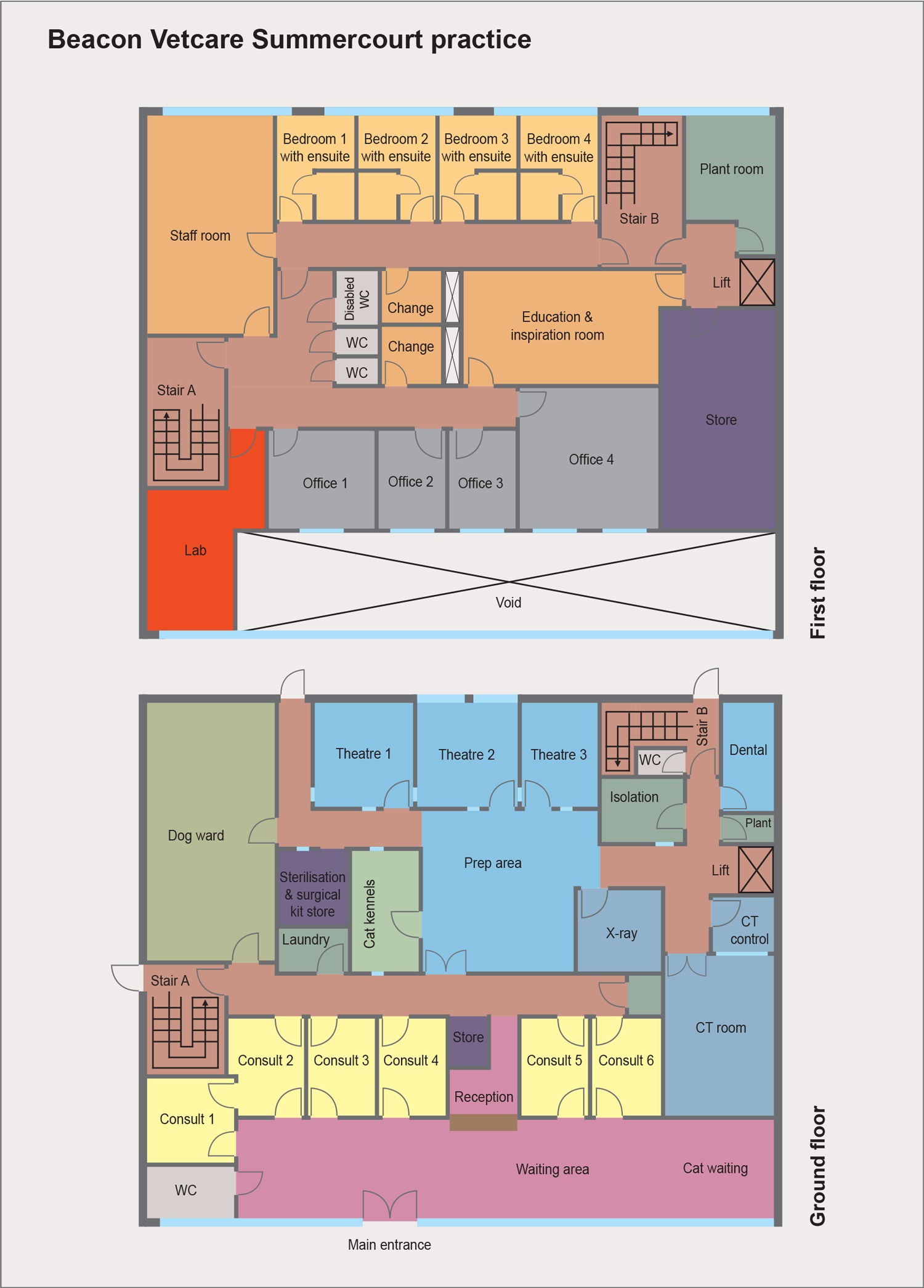
Gathering a launch team of more than 30 professionals amid a general veterinary staffing crisis is an achievement in itself, and the practice has firm plans to continue its rapid growth.
Lizzy added: “People have come from various backgrounds, near and far.
“There are so many stories – some have been friends and colleagues for years, even decades, while some new faces have shown the gumption to drop us a message, from local or afar, then drive down or fly in, stay with us for a few days and then realise they’ve found their home.
“We’ve spoken with nearly a hundred colleagues through the past year and are only now looking to advertise some niche roles, solely through social media groups – not a penny paid on recruitment so far.”
Vet Hattie Algar is emergency service lead, and part of Beacon’s leadership team alongside Colin and Lizzy, with practice manager Darren Terry, joint head nurses Jade and Rachel Hamilton – who played a key role in the fit-out, equipping and launch of both sites – and community lead vet Sarah Hunter.
Hattie said: “The business has been founded on sound morals – a kind, compassionate euthanasia for Mr Bloggs’ 15-year-old terrier is just as important as the list of TPLOs and fracture repairs. Vets and nurses can find their niche doing the work that best suits them; we are all making a difference.
“Since joining Beacon VetCare, there has been a clear emphasis on growing the knowledge and skill set within the team.
“I have enjoyed being able to contribute to the first steps of a brand new practice and working for Beacon VetCare is opening up opportunities for me.”
Darren is another member of the Beacon team relishing being part of growing a new business. He said: “When I first spoke to Colin and Lizzy, and they described their plans and aspirations, I almost immediately asked where do I sign? I love being a part of the journey we are on and I am very proud to work here at Beacon, working with an amazing bunch of people and clients, and I’m looking forward to expanding on what has already been achieved in such a short amount of time.”
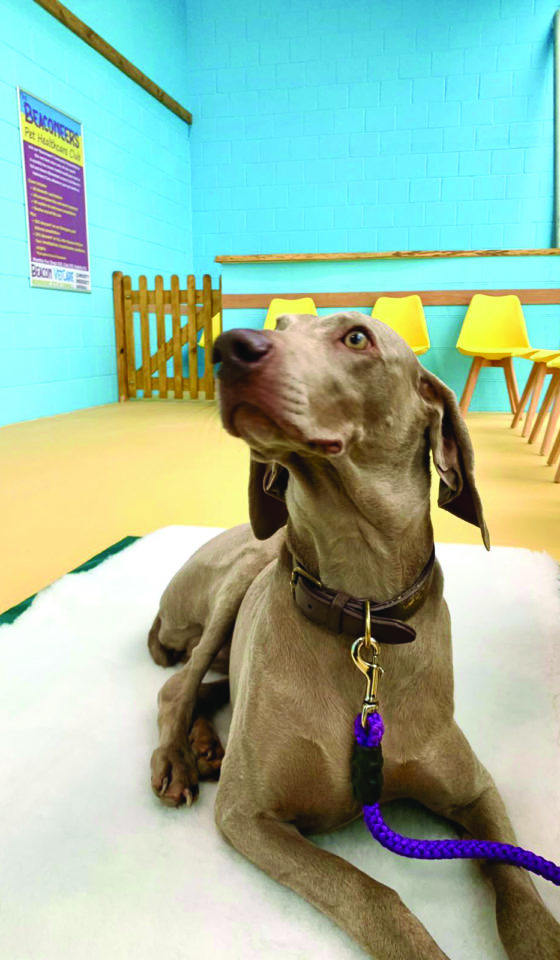
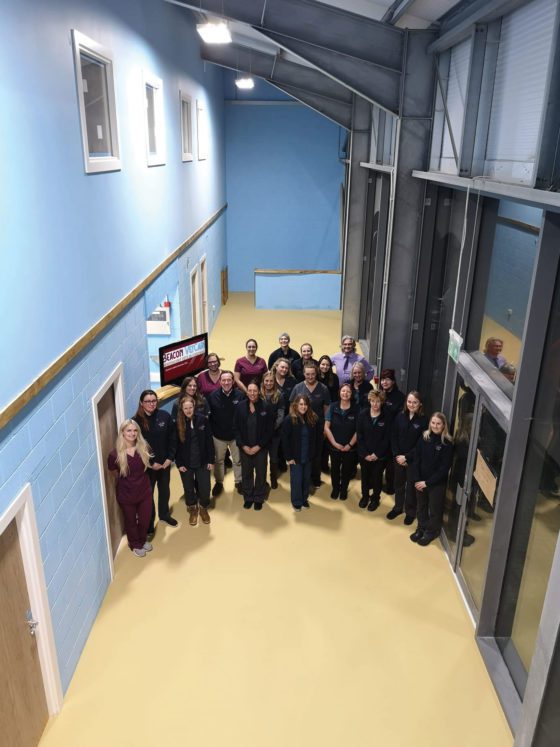
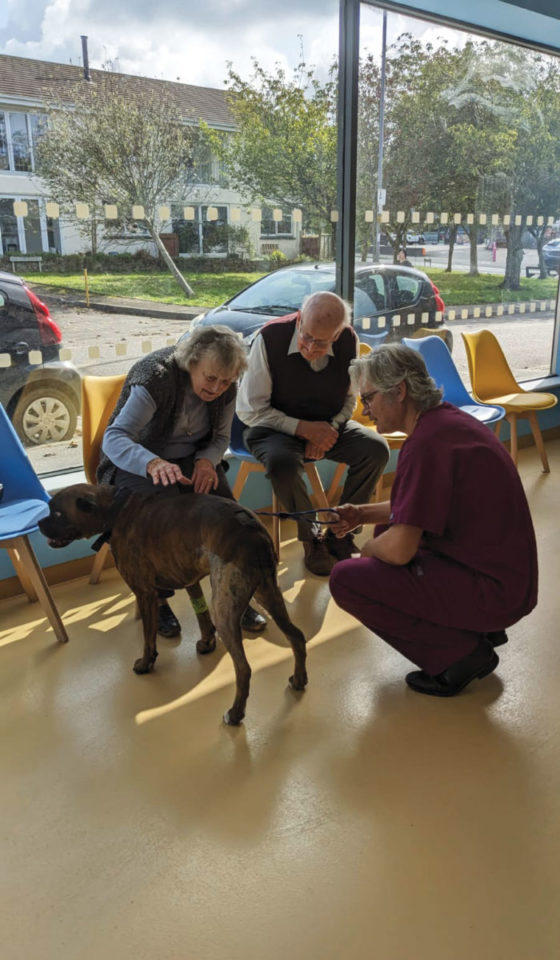
Both Colin and Lizzy are past presidents of the Cornwall Veterinary Association, which continues to thrive and expand in the region.
Colin added: “We’re partly nourished by our geography – we’ve all got to get along, and favours abound from covering deliveries to supporting with on-call; there is healthy competition, but also a strong sense of professional community. And that runs through many aspects of Cornwall, too. This isn’t an outsize holiday park, or a scenic film set – it’s a serious place to call home and there’s a sense of self-reliance and independence in Cornwall that is in itself inspirational.”
Hence when the trio sought local companies as contractors for all the construction work, they got much more than they asked for. Lizzy said: “Luke Dingle and his team, who are the main builders, have been brilliant, as have Phil and Jenny Watt, who have handled the electrics, Adrian the carpenter – in fact all the many people who’ve stepped in and helped the build and design.”
And it has been gratifying for all at Beacon to see that several of the construction team were among the first clients signed up with the new practice. Colin added: “Luke’s dad came in the other day with a tortoise that needed a microchip.
“I hope the next one he brings is a little more cooperative – there is no negotiating with a tortoise that has tucked itself away.”
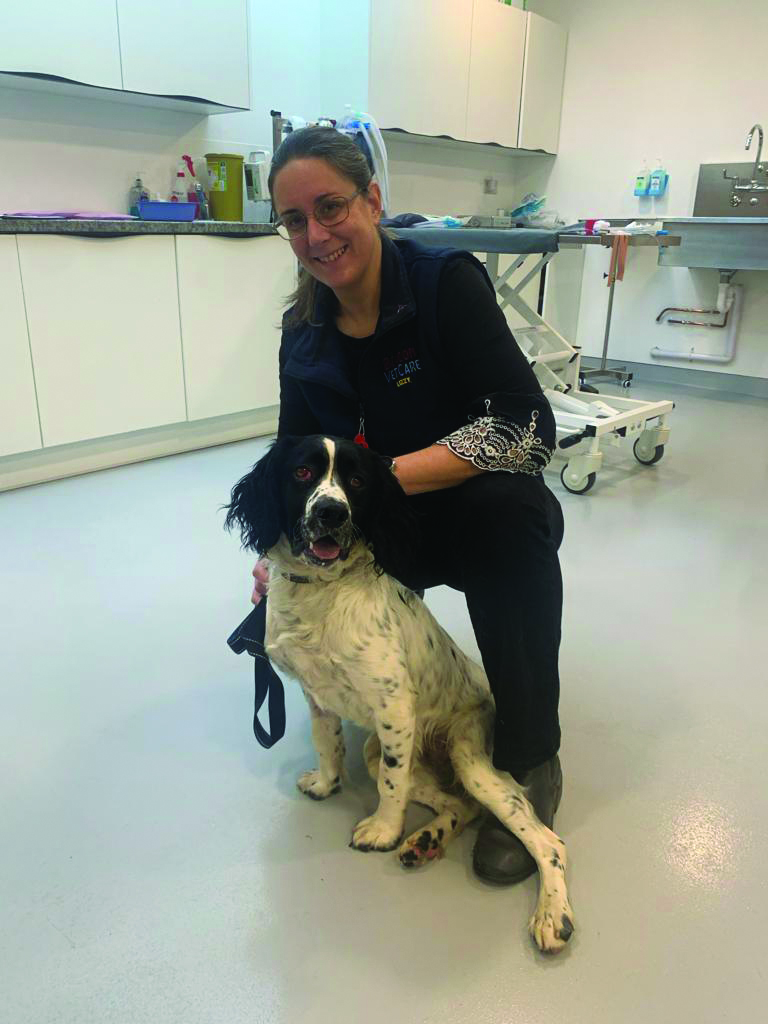
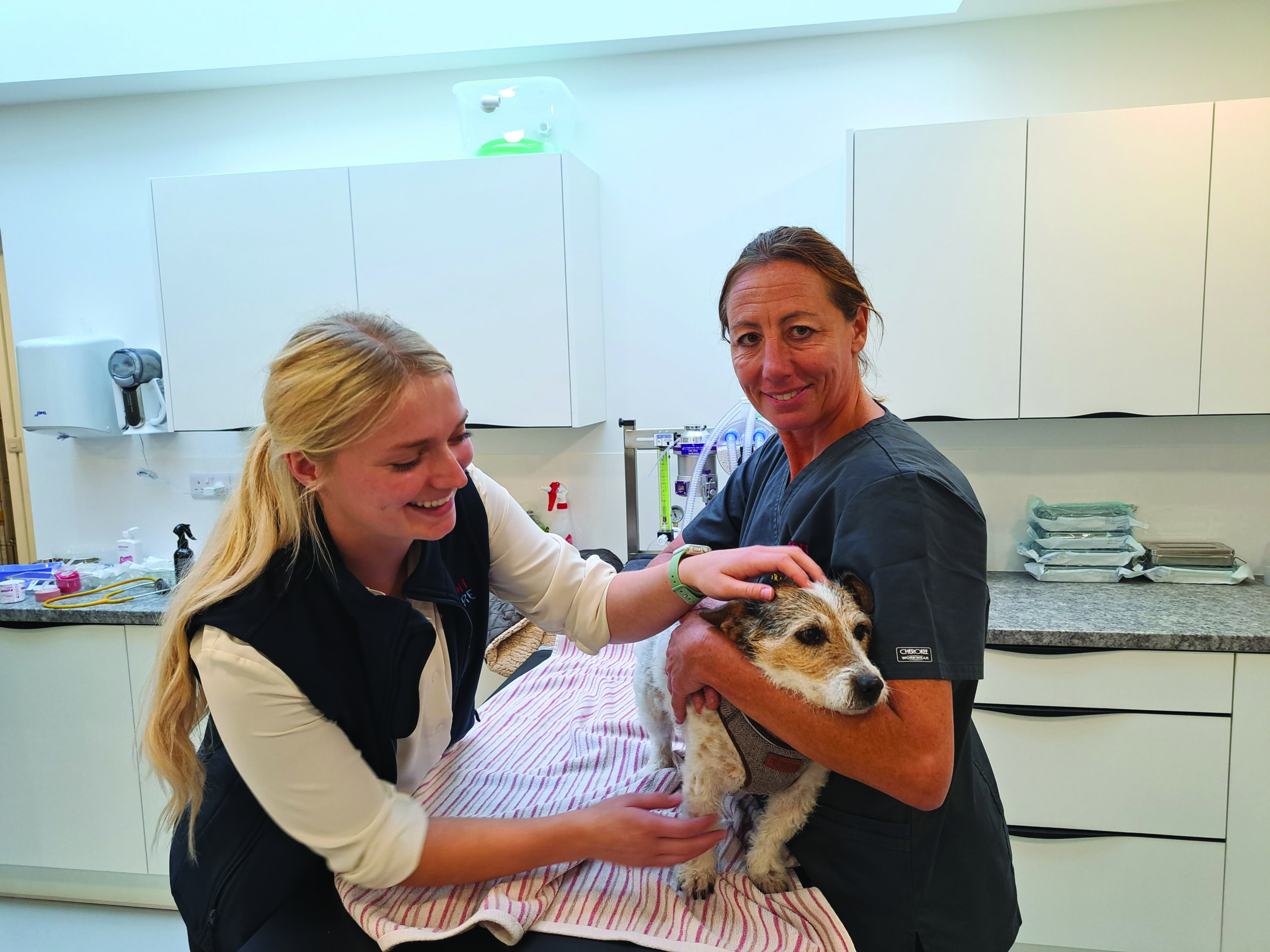
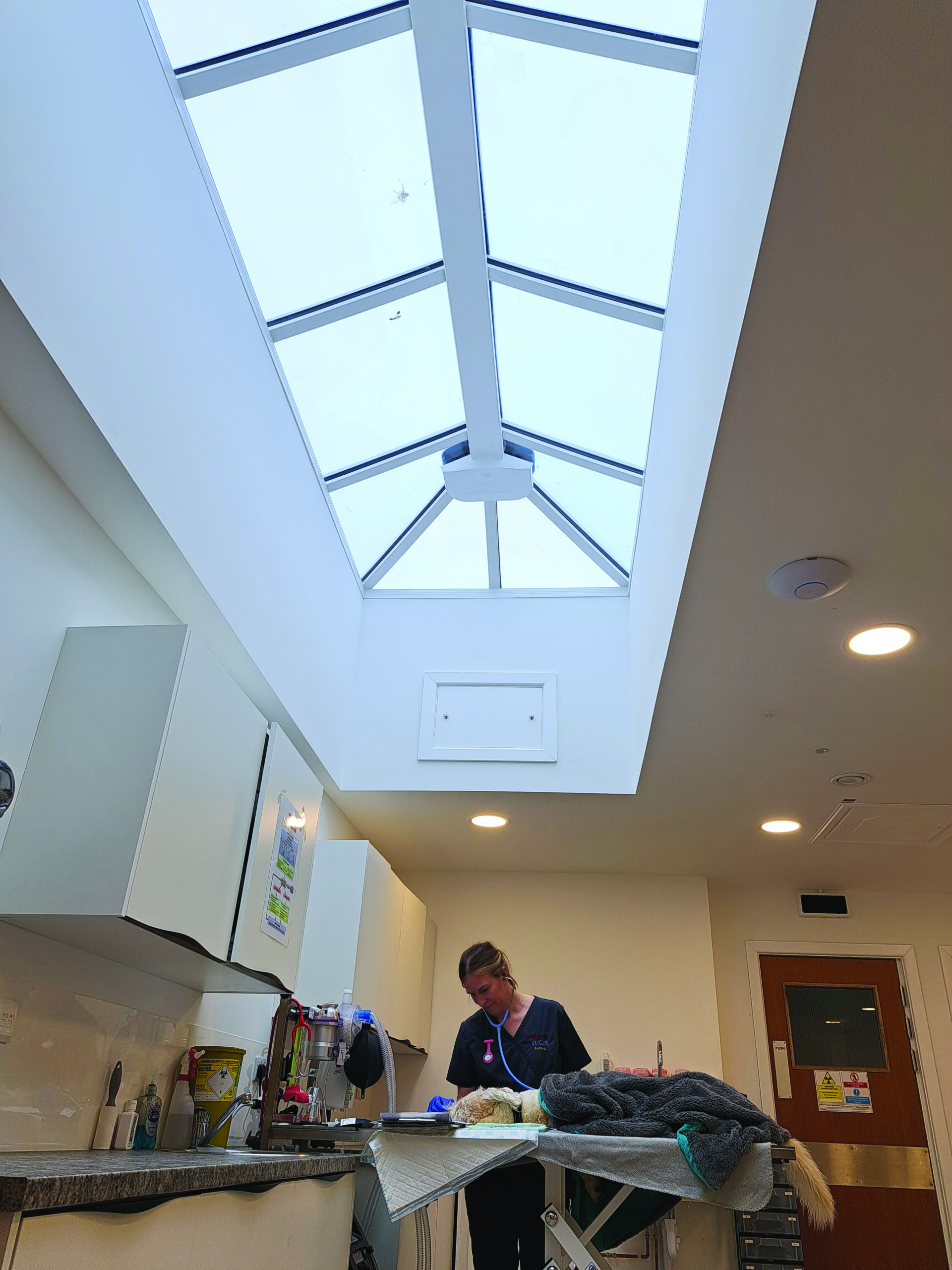
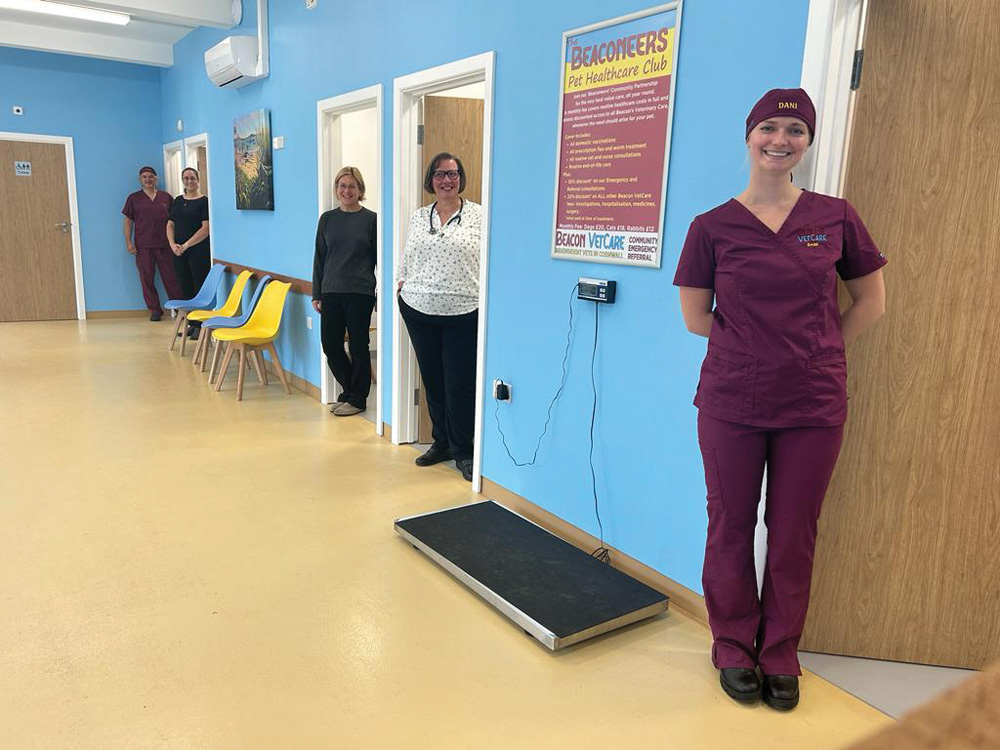
Colin had some experience working on designs for three practices previously. Again, a few strong principles – clinical services downstairs, front and rear exiting consulting rooms, maximise natural light access, minimise corridors, make the buildings easy and efficient to work and, just as importantly, build something that makes people happy.
The Newquay practice has five consult rooms off a sizeable waiting room, with a separate area for cat owners and their pets. Back of house is a central prep room with radiography suite, operating theatre and dentistry theatre, along with the day patient cat and dog wards. It is a very large radial practice facility, but that has translated to its growth, and by month four it’s already a sustainable two FTVE caseload and rising.
Up at the Summercourt site, a high-ceilinged waiting room – again with a separate area for cats – the reception desk and a row of six consult rooms feature. The clinical facilities consist of three operating theatres, a DR x-ray and ultrasound room, four separate patient wards for up to 74 pets and separate room for the Siemens Somatom CT scanner.
The scanner, along with the necessary peripherals and safety features, cost a cool £140,000, but a deliberately affordable fee structure has seen Beacon performing 32 scans in its first month of opening, with up to six patients a day expected once the emergency and referral services are fully operational.
The first floor was still occupied by carpenters, plasterers and electricians at the time of VBJ’s visit.
They were creating office space for the admin staff, a workroom for the clinical staff, a kitchen area, and four bedrooms with en-suite showers and toilets for those staying overnight. At launch this will be one vet and one RVN, plus space for two vet students undergoing EMS training.
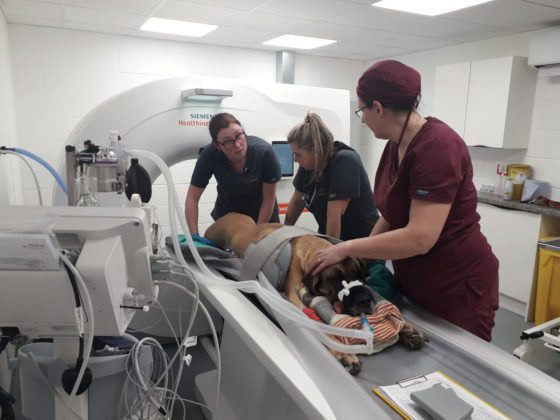
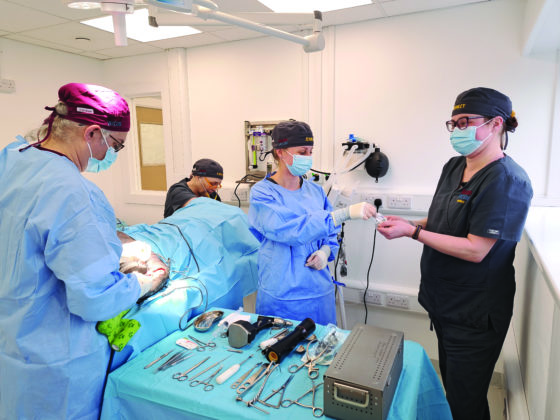
Lizzy said: “We launched the VetWings virtual EMS group during COVID; providing free vet student accommodation is a natural extension of the same principle – we give back to our profession’s future; we make sure we pass on the baton of support, just as we received ourselves.”
The upper storey also contains the feature of the design Colin is most proud of – the “education and inspiration” classroom that will be used for client meetings and in-house CPD events, but mainly for visits by children from local schools.
Colin added: “We’re looking forward to being able to give them early, positive exposure to veterinary practice careers, and kindle some fires of enthusiasm and aspiration among our community. Who knows – maybe some future Beacon employees and directors will be first visiting us in here? Now that would be something to be really proud of.”
